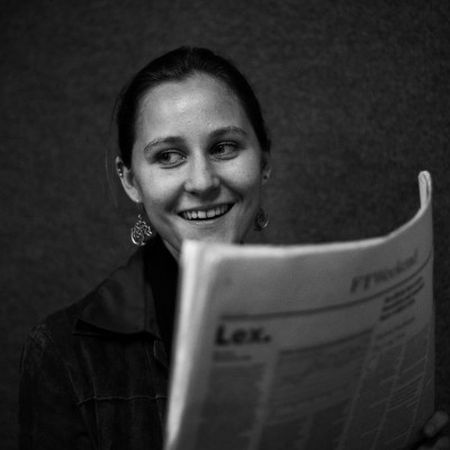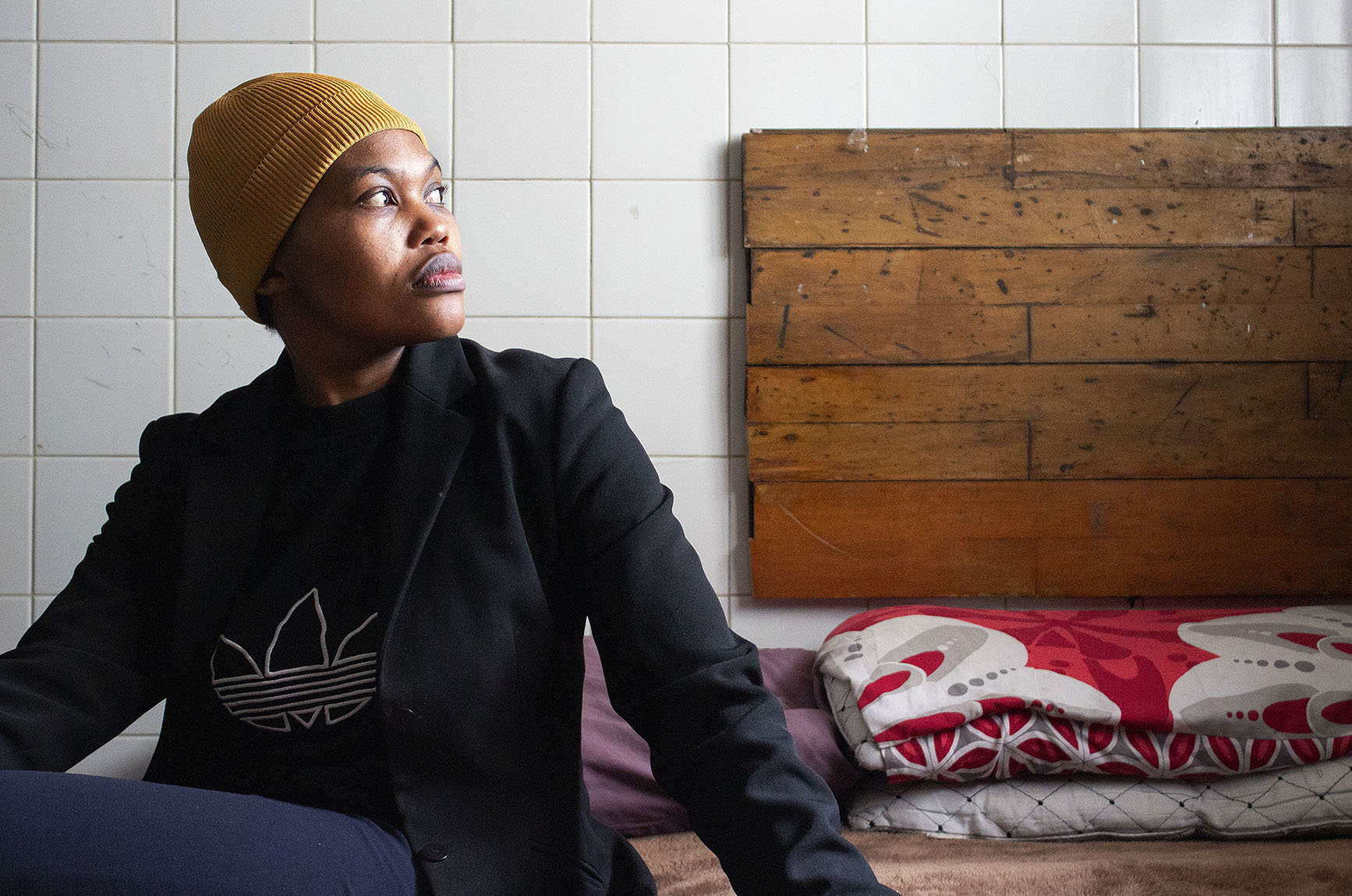Megan Bobotyana is a leader of the community living in Ahmed Kathrada House, an occupied building in Green Point, Cape Town, that was taken over by the members of the housing rights group Reclaim the City during a series of demonstrations for affordable housing in 2017.
Before moving to the building, Bobotyana was just another young woman renting an apartment in Sea Point – attending university for accounting, working three jobs and trying to find her place in the world.
Life “took a turn for the worse” when Bobotyana’s mother lost her job and had to move from the inner city to Khayelitsha, where rental prices were lower.
“I had an education fund, which my parents had set up, so I was studying through there, but because my mom had lost her job. I panicked, and I thought, ‘Well, if I continue to study, then she’s not going to have money to live off,’,” Bobotyana said.
Bobotyana dropped out of university, continuing to live and work in Sea Point while she figured out her next move. However, the apartment block where she was staying had a rule against having a child while renting a room. When Bobotyana fell pregnant, she was forced to move out and join her mother in Khayelitsha.
Not long after moving to the township, she witnessed a terrible crime committed outside the home she was sharing with her mother.
“One of my life’s turning points was when there was a young boy that the community beat up and he died […]. While they were doing this, I went outside and I was shouting at them, saying, ‘You have no right to take anybody's life’. I kept naming people,” Bobotyana said.
“My mom and I realised in that moment that I would never be safe in the township. I was going to be victimised. People were scared that [...] when the police came, I was going to tell them [what happened].”
In 2018, Bobotyana moved into the newly established occupation at Ahmed Kathrada House, formerly known as the old Helen Bowden Nurses Home. It was one of two vacant buildings taken over by Reclaim the City during the 2017 protests, the other being the old Woodstock Hospital (later dubbed Cissie Gool House).
“I heard about Reclaim the City. I loved what they stood for. I loved the fact that it was people actively fighting. It wasn’t just people complaining and burning things down, but coming up with solutions […]. I joined them in 2018 and helped out where I could,” Bobotyana said.
“I came in as a newly single mother, because my kid was still very young. You adapt to a lot of things that happen […]. This place really has the ability to build somebody [...] If you’re not an outspoken person, there are times when […] you have no choice but to speak up […]. Even if you weren’t a leader, the mere fact that you were a Reclaim the City supporter meant you had to fight for something that was yours.”
Read more: From renter to resilient leader: How Linda Dewy transformed her community in Cape Town
/file/dailymaverick/wp-content/uploads/2025/07/Tamsin-AKH-Megan-inset.jpg)
Fighting for work
Bobotyana is among several women who manage the community of about 800 people at Ahmed Kathrada House. One of her fellow leaders, Linda Dewy, noted that many of the families at the occupation were headed by single or widowed mothers.
For these women, life in the occupation provides access to better work opportunities for themselves and quality schooling for their children.
Bobotyana works for a financial services company in Woodstock. Living in the inner city allows her to walk to work when she needs to.
“I need to not be paying R1,500 per month just to get to work. What that basically does is ensures we never build generational wealth, because we have to live hand to mouth. But when you live in this building, you can walk to work,” Bobotyana said.
Members of the community support one another in finding jobs in the surrounding area, Bobotyana said, and even watch out for one another’s children. A number of residents work in the neighbouring V&A Waterfront complex, staffing restaurants and helping out on the ships moving in and out of the harbour.
“It shows that it’s an economy, it works together […]. There are no rich people without poor people […] and that’s the reality. The poor people keep the economy running,” Bobotyana said.
Building a home
Life in the occupation has not been without its challenges. Over the years, leaders have had to mediate conflicts between residents, deal with incidents of gender-based violence and push back against groups seeking to remove them from the site.
“The majority of people that stay here are women and children. One of the things that we really want to get right […] is access control […]. We are still working on that,” Bobotyana said.
She recalled times when leaders spent night shifts watching the entrances of the occupation, staying up until the early hours of the morning to monitor the movement of people into the site.
“These are the things that we do to make sure that our place is safe […] because we love it here. It’s not ideal, it’s not heaven, it’s not our dream place, but it’s home,” said Bobotyana.
Ahmed Kathrada House was occupied during the Reclaim the City protests against the Western Cape government’s sale of the Tafelberg site in Sea Point to a private buyer. The decision sparked outrage among housing rights activists, who argued the property should be used to provide social housing.
The legal battle between housing activist groups and the Western Cape government over the future of the Tafelberg site reached the Constitutional Court in February this year, with the court reserving judgment in the case.
Read more: Cape Town’s Tafelberg case goes to ConCourt — activists call for coordinated affordable housing plan
Bobotyana said that if affordable housing were established on the land around Ahmed Kathrada House, she and other residents would be willing to pay rent to be a part of the development.
“The narrative that [local authorities] have been pushing is that we are queue jumpers [on the housing waiting list]. So, do we sit in discomfort until they decide that this queue is moving? It hasn’t been moving since 1994. My grandmother had been here for how long and she still didn’t have a house. She died, and they hadn’t built her house,” Bobotyana said.
“One of the things that we’re really looking forward to is being part of the community – not to feel like we’re outsiders, queue jumpers, criminals, whatever, but [...] for people to recognise that actually we are […] part of the economy and the ecosystem […]. We’re looking forward to having dignity.”
Daily Maverick contacted the City of Cape Town for comment about its engagement with the occupants of Ahmed Kathrada House, but was referred to the Western Cape government. A query was sent to the provincial government and its response will be added when it is available. DM





 Megan Bobontyana in her room at Ahmed Kathrada House, an occupied building in Green Point, Cape Town. (Photo: Tamsin Metelerkamp)
Megan Bobontyana in her room at Ahmed Kathrada House, an occupied building in Green Point, Cape Town. (Photo: Tamsin Metelerkamp)